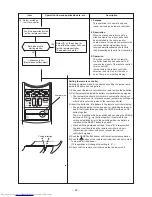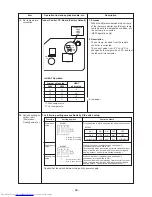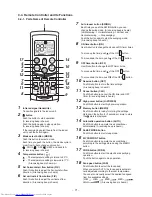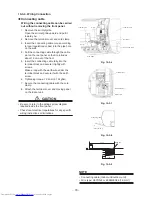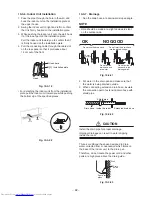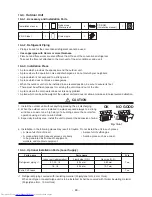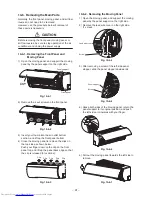
– 81 –
Fig.
10-3-16
K
Left-hand connection with piping
Bend the connecting pipes so that they are
positioned within 43 mm above the wall surface.
If the connecting pipes are positioned more than
43 mm above the wall surface, the indoor unit
may be unstable.
When bending the connecting pipe, make sure
to use a spring bender to avoid crushing the pipe.
Refer to the table below for the bending
radius of each connection pipe.
Fig. 10-3-17
NOTE
If the pipe is incorrectly bent, the indoor unit may be
unstable on the wall.
After passing the connecting pipe through the pipe
hole, connect the connecting pipe to the auxiliary
pipes and wrap the facing tape around them.
K
Piping on the bottom right or the
bottom left
• After making slits on the front panel with a
knife or similar tool, cut them out with a pair of
nippers or an equivalent tool.
Connect the pipe after installation of the unit
(figure)
Outer diameter
6.35 mm
9.52 mm
12.7 mm
Bending radius
30 mm
40 mm
50 mm
Slit
43 mm
Use a screwdriver handle, etc.
(To the front flare)
Outward form of indoor unit
Gas side
270 mm
230 mm
R30 or less (Dia. 6.35), R40 or less (Dia. 9.52), R50 or less (Dia. 12.7)
Make sure to use a spring bender to avoid crushing the pipe.
Liquid side
CAUTION
• Bind the auxiliary pipes (two) and connecting
cable with facing tape tightly.
In case of leftward piping and rear-leftward piping,
bind the auxiliary pipes (two) only with facing tape.
Fig. 10-3-18
• Carefully arrange the pipes so that none of the
pipes stick out of the rear plate of the indoor unit.
• Carefully connect the auxiliary pipes and
connecting pipes to each other and cut off the
insulating tape wound on the connecting pipe to
avoid double-taping at the joint, moreover, seal
the joint with the vinyl tape, etc.
• Since condensation can result in machine
performance trouble, be sure to insulate both
connecting pipes.
(Use polyethylene foam as insulating material.)
• When bending a pipe, be careful not to crush it.
Indoor unit
Connecting
cable
Auxiliary pipes
Installation plate

